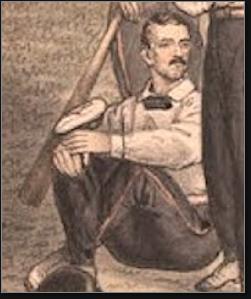
Sport: Baseball
Born: 1844
Died: 188?
Town: Hoboken, New Jersey
Patrick Dockney was born in Ireland in 1844 and grew up in Hoboken, NJ. The city, developed by the Stevens family, was in its infancy. Baseball and other sports were used as a promotional tool to draw New Yorkers across the river to escape the squalor and spend a day at the Elysian Fields. This is almost certainly where Patsy was introduced to the game.
Patsy enlisted in New Jersey’s 21st Infantry as a teenager during the Civil War and survived the battles at Antietam, Fredericksburg and Chancellorsville. These were no small skirmishes; when Patsy mustered out, he was possibly suffering from PTSD, having witnessed human carnage on an industrial scale. He was solidly built and explosive, both physically and emotionally, and probably an alcoholic by the time he joined Harry Wright’s New York Gothams for the 1864 & 1865 seasons. Patsy was the best offensive player on the 1865 club, scoring 26 runs in nine games.
In an era when ball teams put their best athlete at catcher, Patsy was an adept receiver of even the speediest hurlers and he was a good hitter. He once hit a home run over the pagoda in center field of the Union Grounds in Brooklyn. In 1866, he was lured to the Athletic Club of Philadelphia with the promise of a no-show job as the city’s inspector of fireplugs. He caught and played the outfield. The Athletics had another pro on the team, pitcher Dick McBride, a hard underhand thrower. Patsy was one of the few backstops who could handle him.
Patsy was a transitional figure in an era when baseball was abandoning the last vestiges of genteel amateurism and heading toward becoming a business. Social and professional clubs had been at the forefront of advancing the game in the 1850s and 1860s, but by this time the most competitive ones were bending the rules in order to acquire talent, and Patsy was the unruliest kind. After catching a game, Patsy would likely be found drinking and fighting somewhere nearby that evening. The Philadelphia Times described him as “the tough of toughs.” During a road trip to St. Louis in 1866, he received a slash from a meat cleaver that required 50 stitches to close—and still showed up to play the next day, defying doctors’ orders to convalesce for a month or more
In October, the Athletics traveled to Brooklyn to play the Atlantics in what was ostensibly a championship game. They lost, leading fans to suspect that Patsy, McBride and other professional imports must have thrown the game for money. Of course, these same fans had welcomed the mercenaries with open arms when the year began.
In 1867, Patsy played for the Eureka club of Newark. Sluuger Everett Mills was a teammate, but Patsy was clearly the star of the team. At the end of the season, he was a member of the select squad representing New Jersey in a game against the best of New York City. He caught and batted leadoff, with Mills at first base and Newark stars Charlie Sweasy at second and Andy Leonard at third. All would go on to play professionally in the National Association and National League. The game was exciting, with the Manhattanites opening up an early 10–0 lead and the New Jerseyans storming back to lose by a run, 24–23.
Following the money, Patsy headed to Cincinnati that winter but did not catch on with Harry Wright’s club there, the Red Stockings. Instead he played for their rivals, the Buckeyes, captaining the club in 1868. He was almost immediately wounded in a bar fight which kept him off the field until June, and then he jumped the club in August, returning to New York to finish the season with the Mutuals.
Patsy’s off-field lifestyle finally caught up with him. He was out of baseball in 1870 and arrested for larceny in 1871. He became a fish monger in New York’s Washington Market and died sometime in the 1880s from knife wounds suffered in yet another barroom brawl.